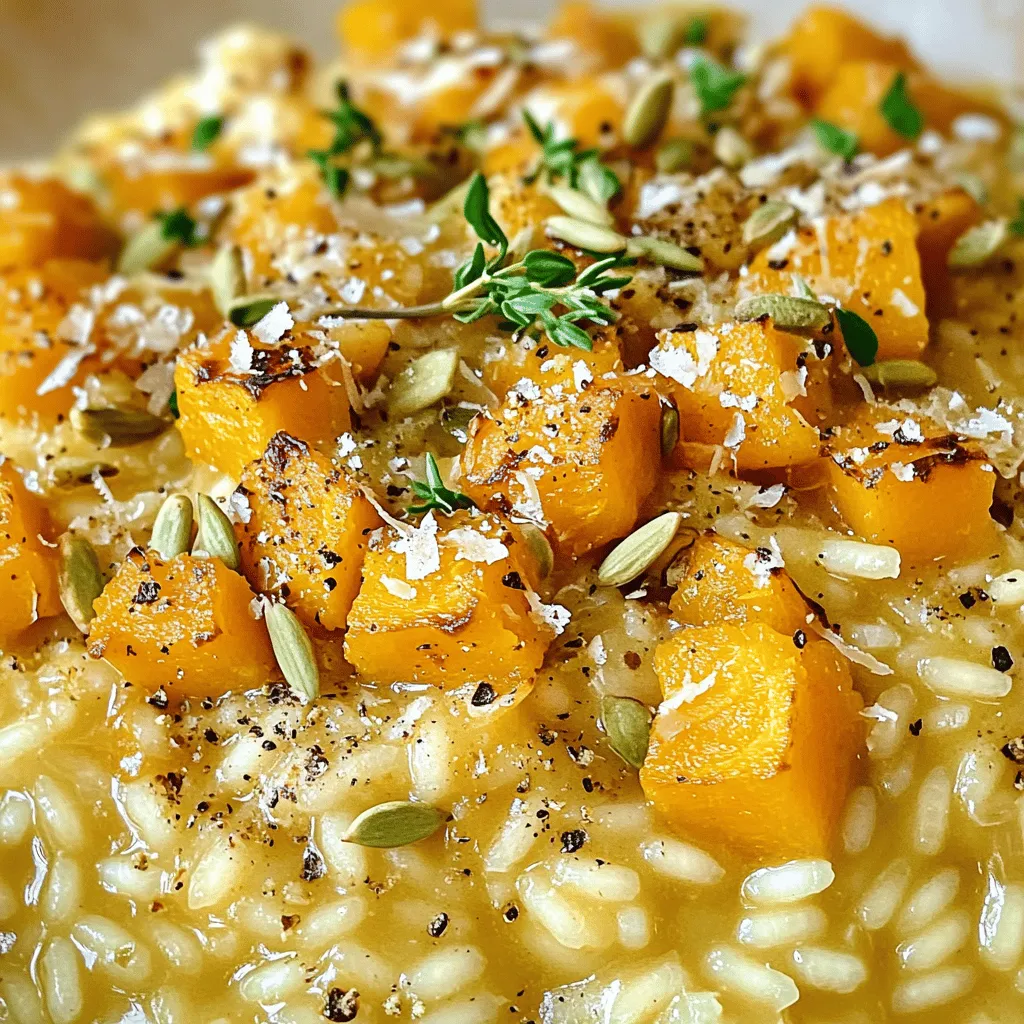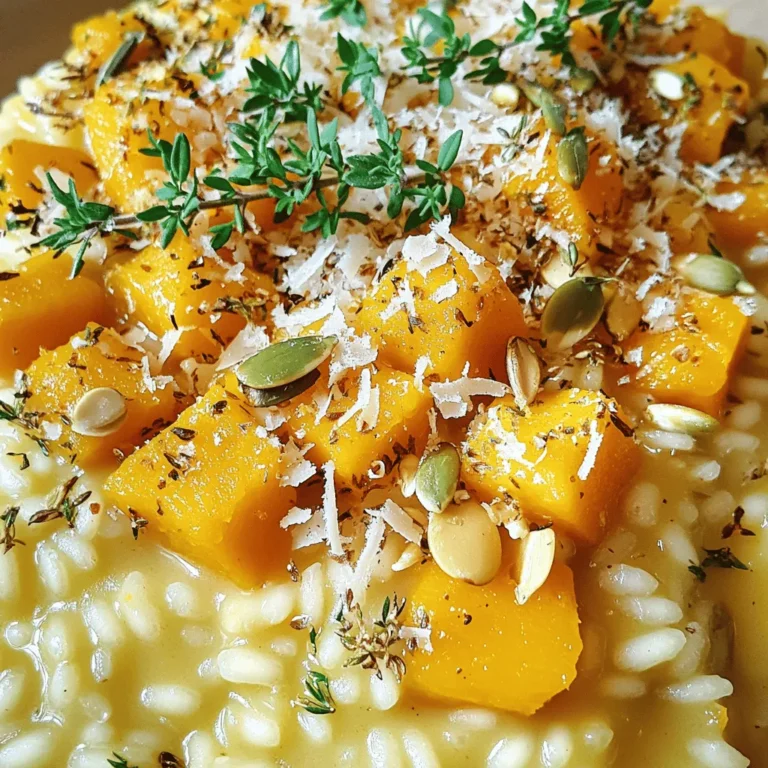Dreaming of a dish that wraps you in warmth and comfort? Butternut squash risotto is the answer. With its creamy texture and rich flavors, this dish is perfect for both cozy nights in and dinner party impressing. In this guide, I’ll walk you through every step and share tips for cooking the best risotto of your life. Ready to dive in? Let’s make some magic in the kitchen!
Ingredients
Complete List of Ingredients
– 1 medium butternut squash, peeled and cubed
– 1 cup Arborio rice
– 1 medium onion, finely chopped
– 2 garlic cloves, minced
– 4 cups vegetable broth
– 1/2 cup grated Parmesan cheese
– 2 tablespoons olive oil
– 1 tablespoon unsalted butter
– Salt and pepper to taste
– 1 teaspoon fresh thyme leaves (or 1/2 teaspoon dried thyme)
– 1 tablespoon fresh lemon juice
– Optional garnish: toasted pumpkin seeds and fresh parsley
Gathering the right ingredients is key for a great butternut squash risotto. The butternut squash gives this dish its sweet flavor and creamy texture. Arborio rice is special; it absorbs flavors well and becomes soft and creamy.
Onions and garlic pack a punch of flavor. They add depth when sautéed. The vegetable broth keeps the risotto creamy. I like to keep it warm for the best results.
Parmesan cheese adds a nice, rich taste. It melts in and makes the risotto even creamier. Olive oil and unsalted butter help with cooking and flavor.
Seasonings like salt and pepper are must-haves. Fresh thyme adds a nice touch, and lemon juice brightens the dish. For a fun finish, I like to add toasted pumpkin seeds and parsley on top.
You can find the full recipe for this comforting dish and impress your family or friends.
Step-by-Step Instructions
Preparing the Broth
Start by warming your vegetable broth. Keeping it hot helps the rice cook evenly. If you use homemade broth, it often has more flavor. Store-bought broth works too. Just pick a low-sodium version. This way, you control the salt in your dish.
Cooking the Squash
For the squash, warm olive oil in a large skillet over medium heat. Add the cubed butternut squash and sprinkle with salt and pepper. Sauté for about 8-10 minutes. You want it tender and starting to caramelize. This adds a sweet, rich flavor to your risotto. Once done, remove it from the skillet and set it aside.
Sautéing Aromatics and Toasting Rice
In the same skillet, add more olive oil and some butter. When the butter melts, toss in chopped onion. Cook for about 5 minutes. Stir until the onion turns soft and translucent. Then add minced garlic for one more minute. This step builds your flavor base. Next, add the Arborio rice. Stir it for about 2 minutes to toast it. This gives the rice a great taste and helps it absorb the broth better.
Gradual Broth Addition
Now it’s time to add the broth. Use a ladle and pour in one ladle at a time. Stir often and let each addition soak into the rice before adding more. This process takes around 18-20 minutes. Keep stirring until the rice is al dente and creamy. This stirring is key to getting that perfect risotto texture.
Incorporating Squash and Cheese
Once the rice is creamy, gently fold in your cooked butternut squash and grated Parmesan cheese. Stir in thyme and lemon juice for fresh flavor. Mix well to combine everything. Taste your risotto and adjust the salt and pepper as needed.
Final Serving Suggestions
To serve, let your risotto rest for a couple of minutes. This helps the flavors settle. For a beautiful presentation, serve it in shallow bowls. A drizzle of olive oil on top adds a nice touch. You can also sprinkle toasted pumpkin seeds and fresh parsley for added flavor and crunch.
For a complete guide, check out the Full Recipe.
Tips & Tricks
Common Mistakes to Avoid
1. Overcooking the rice: Risotto should be creamy but not mushy. Cook it until the rice is al dente. This means it should have a slight bite to it.
2. Skipping the toasting step: Always toast the rice before adding broth. This boosts the flavor and helps the rice absorb the liquid better.
Enhancing Flavor
– Suggestions for extra aromatics: Try adding shallots or leeks for a sweeter taste. Fresh herbs like rosemary or sage can also add depth.
– Alternative cheese options: While Parmesan is classic, you can use Pecorino Romano or a sharp cheddar for a unique twist. Just keep in mind that it will change the flavor profile.
Cooking Techniques for Perfect Risotto
– Stirring method for creaminess: Stir the risotto often while adding broth. This helps release the rice’s starch, which creates that creamy texture we love.
– Alternative cooking methods: If you’re short on time, try oven-baked risotto. Combine your ingredients in a baking dish, add broth, and cook it in the oven. It saves you from constant stirring!
By following these tips, you’ll create a butternut squash risotto that is both delicious and creamy. For the full recipe, check out the details above.

Variations
Seasonal Variations
You can switch up the veggies in your butternut squash risotto. Try using asparagus or green peas. Both can add color and taste. You can also add proteins like chicken or shrimp for extra flavor. Just cook them separately and mix them in at the end. This makes the dish heartier and more filling.
Dietary Adjustments
If you want a vegan risotto, skip the cheese and butter. Use olive oil and vegan cheese instead. You can also add more veggies to keep it tasty. For gluten-free options, make sure to use gluten-free vegetable broth. Arborio rice is naturally gluten-free, so you are good to go!
Flavor Enhancements
Adding spices can make a big difference. Try a pinch of nutmeg or cayenne for a kick. You can also mix in fresh herbs, like basil or parsley, for more aroma. These small tweaks can take your risotto to the next level of flavor. If you want to explore more ideas, check the Full Recipe for suggestions!
Storage Info
Refrigeration Tips
To store leftover butternut squash risotto, place it in an airtight container. This helps keep it fresh. Make sure to cool it down first to avoid steam buildup. Butternut squash risotto will last about three days in the fridge.
Freezing Guidelines
If you want to freeze your risotto, use a freezer-safe container. Leave some space at the top for expansion. Risotto can last up to three months in the freezer. When you are ready to eat it, transfer it to the fridge overnight to thaw.
Reheating Techniques
To reheat butternut squash risotto, use a pot over low heat. Add a splash of broth or water to keep it creamy. Stir gently to avoid clumping. If it seems dry, add more liquid as needed. This helps maintain its smooth texture. Keep stirring until it is heated through.
FAQs
What can I substitute for Arborio rice?
You can use Carnaroli or sushi rice. Both have a similar starchy quality. This helps create that creamy texture we all love. Just remember, the cooking time may vary slightly.
How can I make risotto creamier?
Add more broth slowly while stirring. You can also mix in some cream or additional cheese at the end. This will boost the richness and flavor. Don’t forget to keep stirring. It helps the rice release its starch.
Can I use frozen butternut squash?
Yes, frozen butternut squash works well! Simply thaw it before use. You may need to cut down the cooking time slightly since it’s already cooked. Just make sure to sauté it until heated through.
Is butternut squash risotto gluten-free?
Yes, butternut squash risotto is gluten-free! Just check your broth and cheese for gluten content. Most vegetable broths are safe. Always read labels to be sure.
In this blog post, I shared a complete guide to making butternut squash risotto. You learned about key ingredients, step-by-step instructions, and helpful tips. I covered variations for different diets and how to store leftovers properly.
Remember, making risotto is all about patience and practice. Follow these tips, and you’ll create a creamy and flavorful dish. Enjoy experimenting with flavors and adjusting it to your taste! Every step in this process leads to a delicious meal that you can share.


